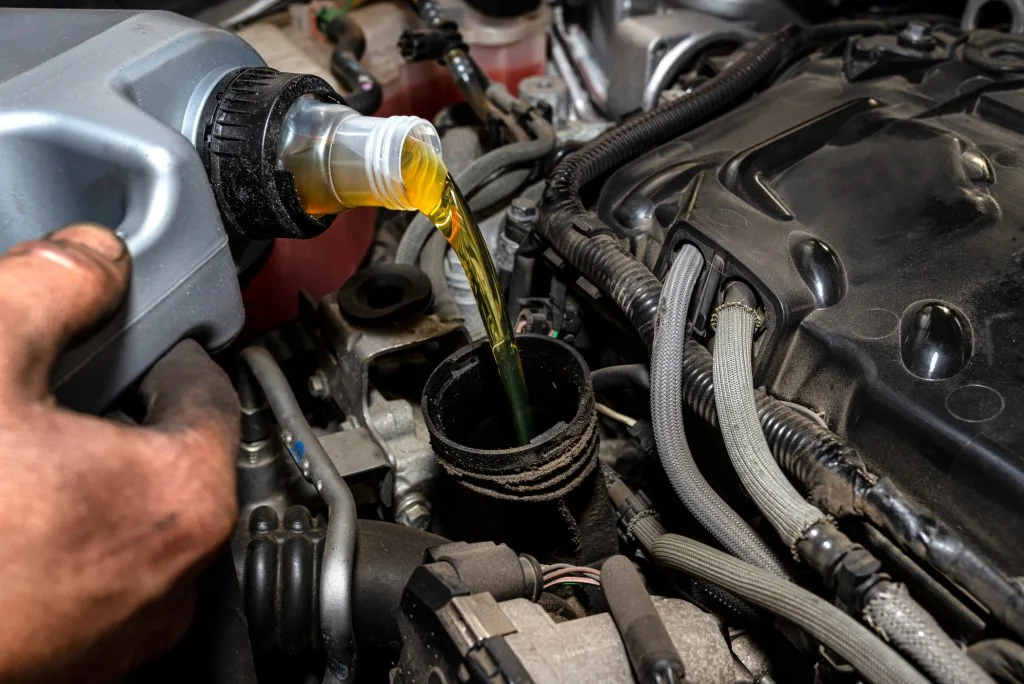Awareness of your vehicle maintenance when towing an RV or trailer is extremely important. Your vehicle’s oil falls into this category. Make sure you know about oil levels and when to change them as it relates to towing. We’re here to help with a quick guide.
Keep reading to learn if you should change your vehicle’s oil sooner rather than later when towing. And we break down some of the critical questions on the topic.
Let’s get started.
Is Towing Hard On Oil?
Towing isn’t hard on oil, but your engine will burn more oil while towing.
The motor works harder when the vehicle is pulling something, so it’s ineviditable that it will need more oil. And you hit higher rpms for longer periods when towing.
Does Towing A Trailer Use More Oil?
Since towing a trailer burns more oil because your engine is working harder, you will go through greater amounts. Towing puts extra stress on the motor, even when you’re using tow haul mode, so the life of the oil decreases.
Plan ahead and carry some oil with you when traveling, especially long distances or through mountainous regions.
Pro Tip: Before you hitch up and head out, make sure you can check off everything on our RV Trailer Towing Checklist.
How Do You Know When To Change Your Oil?
We strongly recommend checking your oil often when towing long distances or for extended periods. Keeping enough oil in your vehicle is the first step. If the oil level is extremely low, it’s time to change it. Or, if the consistency of your oil is different, it’s time to change it.
There are other ways to know when to change your oil. The first is paying attention to mileage, but more on that later. Other reasons to change your oil, include your engine making noises it hasn’t before. Or if you smell something burning, there’s a good chance your oil needs to be changed. In addition, if your dashboard oil light is on you should attend to it right away.

Should You Change Oil Sooner If You’ve Been Towing?
It is recommend to change your oil sooner than the manufacturer standard, if you’ve been towing frequently or long distances.
Changing your oil every 5,000 miles when towing tends to be the consensus among truck owners. Be sure to research what it is recommended for your specific vehicle make and model.
Is Oil Change Based On Mileage Or Time?
The intervals for changing oil on a vehicle has changed somewhat over the years and can vary depending on your model. The “change it every 3,000 miles or every three months” rule is often obsolete.
A general rule of thumb is to change the oil based on mileage that the manufacturer recommends and not on a time period.
Newer vehicles have computer alerts to remind you when to change the oil. Most mechanics would say those are not necessarily reliable, so instead pay attention to your mileage and change the oil accordingly.
In addition, always be sure to select the correct oil for your vehicle. Look up what the manufacturer requires for your vehicle’s make and model.
Pro Tip: Don’t know what to do with your oil after you change it? We uncovered Can You Dispose of Used Motor Oil at Walmart?

Is It Bad To Get An Early Oil Change?
While changing oil early isn’t bad, there are other affects you may have not considered. Oil is hard on the environment. So the more old oil you get rid of to put in new, the more oil is laying around. It may not seem like a lot, but overtime if everyone uses more oil it adds up.
How Often Should You Change Your Oil If You Don’t Drive Much?
You should get your oil changed at least twice a year regardless of how much you drive. Oil can degrade over time so you don’t want to leave it when not using your vehicle.
Bad oil can cause problems with your engine, so it’s best to change your oil whether you drive alot or not.
Does Towing Decrease Oil Life?
Towing doesn’t decrease oil life, but it does cause your motor to burn more oil. For this reason it’s important to keep up with regular oil changes. And when you’re towing, be sure to keep an eye on your oil levels and consistency. Like with most things, it’s better to err on the side of safety.
How often do you change your oil when towing? Is it time to adjust your maintenance schedule? Drop a comment below!
Discover the Best Free Camping Across the USA
To be honest with you, we hate paying for camping. There are so many free campsites in America (with complete privacy).
You should give it a try!
As a matter of fact, these free campsites are yours. Every time you pay federal taxes, you’re contributing to these lands.
Become a FREE CAMPING INSIDER and join the 100,000 campers that love to score the best site!
We’ll send you the 50 Best Free Campsites in the USA (one per state). Access the list by submitting your email below:
Oil analysis [such as Blackstone Labs] can tell you if you have used up the additives in oil. At $30, this is a substantial fraction of the cost of an oil and filter change. Unless: you have a 12 quart oil capacity, and the Sprinter requires Mobil 1. You can also spot developing problems if unusual amounts of trace minerals appear in used oil. I always test oil prior to the expiration of a warranty.
I don’t usually put that many miles on my F150 or on my wife’s car so I generally change once a year according to the manufactures mileage recommendations. You first said change according to miles not time but you closed by saying change at least twice a year. Which should it be?